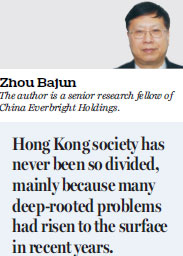HK must work toward social harmony
Updated: 2017-03-27 06:43
By Zhou Bajun(HK Edition)
|
|||||||
Former chief secretary Carrie Lam Cheng Yuet-ngor, as widely expected, emerged victorious in the fifth-term Chief Executive election of the Hong Kong Special Administrative Region on Sunday. Looking back at the election campaign platforms of the three candidates, they agreed on the need to address the issues that divide Hong Kong society, but differed on how to do this policy-wise.
Former financial secretary John Tsang Chun-wah initially suggested a period of no political rivalry for the SAR to "recuperate and rebuild" but later changed his mind and expressed his intention to start constitutional reform aimed at achieving universal suffrage in CE elections, and national security legislation according to Article 23 of the Basic Law. But he had no difficulty understanding that restarting the two processes would only further split Hong Kong society. Retired judge Woo Kwok-hing, meanwhile, insisted from the start that future constitutional reform would not need to follow the "Aug 31 decision" made by the nation's top legislature in 2014.

Unlike the other two candidates who promised untimely constitutional reform to appease the "pan-democratic" camp, Lam prioritized livelihood issues. She is convinced that Hong Kong is unlikely to have the right political conditions to re-launch constitutional reform or national security legislation in the next five years. That is why she believes the next SAR government should focus on economic development and improving people's livelihood, which would pave the way for restarting the two constitutional exercises when Hong Kong is ready. Her campaign platform included proposals aimed at reducing political bickering and building social harmony. Now that she has won the CE election, we can look forward to concrete steps to introduce and implement those policies.
Hong Kong society has never been so divided, mainly because many deep-rooted problems had risen to the surface in recent years. These social problems did not happen overnight and cannot be mended right away. It will be a long and arduous process for Hong Kong society to tackle them and improve social harmony.
According to the central government's advice and the CE-elect's election platform, the next SAR government needs to address the following issues to mend socio-political division and build harmony.
First and foremost, it must defeat separatism and safeguard the statutory and political bottom line - the "One Country, Two Systems" principle - no matter what. "Hong Kong independence" is not a matter of whether one likes it or not. Lam pointed out clearly that Hong Kong is an inalienable part of China and, therefore, there's no room for discussion about "independence". We must maintain steadfastly the "One Country, Two Systems" principle or there exists no hope for social harmony.
Secondly, we must do our best to ease the growing pressure on various local communities as soon as possible. Lam promised during her election campaign that the next SAR government would add HK$5 billion a year to education spending - the first thing to do after taking office; multiple measures will be introduced to boost the morale of civil servants. The next SAR government will also invest more resources and effort in increasing land supply for public and subsidized housing, as well as improving the existing public-housing policy structure. There are many similar policy proposals aimed at improving public affairs that should be carried out in the next five years.
Thirdly, significantly more efforts should be made to advance Hong Kong's economic transformation while introducing tax reform to benefit small and medium-sized enterprises (SMEs), which account for more than 98 percent of the city's total enterprises, and their employees, so that most local residents will get a bigger share of the wealth they jointly create.
Up next will be poverty alleviation and more effective measures to help underprivileged people. That means greater efforts to strengthen social security for the least-capable population. The current government has done a remarkable job in this respect and the next one has every reason to do even better.
Also high on the next SAR government's agenda will be mobilizing all walks of life to fuel the younger generation with positive energy, as well as helping young people gain better education, find proper jobs and get on board the "homeownership train".
Last but not the least, greater efforts are needed to clear the way for Hong Kong's further economic integration with the mainland, which had run into many obstacles in the past 20 years or so.
(HK Edition 03/27/2017 page5)